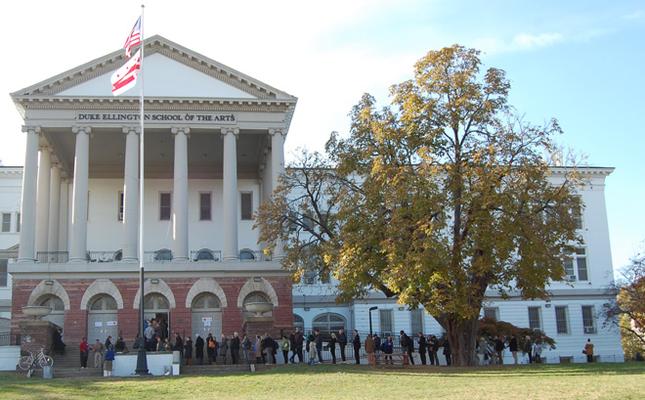The Post-Election Changes of These Still United States
By • November 16, 2012 0 2180

Even today, we don’t know how much hope there is, but we do know that we have a lot of change in these United States of America.
President Barrack Obama’s focused, convincing and hard-driving victory over Republican challenger Mitt Romney did more than secure a second term for him. It revealed a country that is visibly, noticeably changing in its electorate and its electoral makeup, and it was that country—diverse, not so retrograde and dissatisfied as the opposition might have imagined, fluid, multi-layered, mult-racial, and, well, multi-multi-that the president managed to engage in ways that his opponent did not.
In the end, it was the economy, stupid, but more so it was also all those other things, as well as Obama’s well-noted efficient “ground game,” the get-out-the-vote success of his varied constituencies which won the long night for him.
As predicted—while predictable results on the red and blue sides emerged throughout the night—it was the so-called battleground states which decided the issue. The longer Florida, Ohio, North Carolina and Virginia remained “too close to call,” the harder it looked for Romney, because Obama was grabbing up some other potential tossups—including Colorado, Nevada, New Hampshire and Gov. Scott Walker’s wonderland, Wisconsin, as well as Minnesota and—predictably—Pennsylvania, where Romney had spent some time late in the game.
These things, in retrospect, sometimes look inevitable, but that wasn’t the case here. What was the case was that we didn’t know what was going to happen until very late in the night, and by then the floodgates opened for some revealing results. Everyone, in some way, behaved predictably—when the call for Ohio came in, ending the race, for instance, the Romney forces insisted that Ohio was still in play, and Karl Rove got into an argument on the air with Fox News anchors who had also called it. In short, somewhat sullenly, the Romneyites, perhaps thinking there was another Florida fiasco in the air, fought longer than they should have.
It’s always interesting to watch the networks at work on such an occasion—there was NBC News, for instance, turning Rockefeller Plaza’s ice rink into a giant blue and red map of the United States, but for now it was the closest thing to a hockey game we can get. Rumors floated in tweet-land that ABC News anchor Diane Sawyer was inebriated because she slurred some words, another instance where the Internet is some kind of circus in attendance to the more serious matters going on. One famous singer tweeted, “I’ll have what she’s having.” This kind of thing—tweeting anything you feel like tweeting—is another sign that we are in a modern version of the latter days of the Fall of the Roman Empire. So is Donald Trump, who called the Obama victory a sham and a travesty, an injustice, and called for revolution.
Romney, who had written only a precisely counted victory speech, was not at a loss for words, although they were few. He graciously conceded, said the president was in his prayers, and visibly disappointed, exited the public stage for now. During his acceptance speech in the wee hours, Obama promised to speak with him at some length in the near future.
In the end, Obama won the popular vote and the electoral vote (handily, with 303) and had some coattails to spare. It’s hard to say who helped whom in Virginia, where Tim Kaine caught up with and barreled past George Allen in a hotly contested senate race and where Obama finally caught Romney.
Two of the more notorious Tea Party candidates running for the U.S. Senate—Todd Akins in Missouri and Richard Mourdock in Indiana, lost, after sounding off on abortion and rape in a way that deeply offended just about most reasonable people, but especially women. Tack on a win by Elizabeth Warren over Sen. Scott Brown, R-Mass., and that led the way to the Democrats slightly widening their margin in the Senate although the GOP maintained their hold on the House.
If the evolving electorate and a steady but slightly improving economy might have led the way to an Obama victory, it was a victory that left Obama in place, facing a debt crisis —the famous “fiscal cliff”—against what appears to be a still intransigent House of Representatives if Speaker John Boehner’s remarks about taxes were any indication. The president has to find a way to end the deadlock, the partisanship, the blue and red mentality, the conservative mentality of deep divide and enmity that now exists, without feeling the need to capitulate or be so combative as to turn off conciliation. The other side—the House tea partiers, Boehner, the crafty majority leader Eric Cantor, et al., need to come to the table with something to offer besides what they’ve offered in the past—which is nothing. Maybe New Jersey Gov. Chris Christie and Bruce Springsteen, minus Meat Loaf, can show the way.
Still, as there always is in an election, there’s something exhilarating about the process, however cumbersome, sometimes inefficient, difficult and gigantic it appears. Here we are on a Thursday, the numbers are all in. While Florida is still somehow not official—not that it matters—we know who won, with a certainty that won’t be reversed.
We can debate and talk about what it all means, but little national elections went off all over the country with their own secret meanings. It’s remarkable in New Jersey, in New York, in Connecticut and here in Washington, D.C., people flocked to the polls despite the fact that Obama was a lock in all of those place. There appeared a great, unquenchable desire to be heard and noted. I felt it when I voted, I felt part of a place and a country—and that was a good thing.
Here in D.C., things remained much the same—Councilman Vincent Orange retained one of the at-large council seats as a Democrat, but incumbent Michael A. Brown lost to David Grosso. Both ran as what can only be called faux independents. Everywhere else, it was status quo—Yvonne Alexander buried newly minted Republican Ron Moten in Ward 7, Jack Evans won Ward 2 unopposed, and Marion Barry was returned to the council from Ward 8. Phil Mendelson remained District Council Chairman.
In Maryland, the gay marriage proposition—the first passed at the state level—won, as did the Dream Act proposition and the gambling proposition. In Colorado, the people passed a proposition legalizing marijuana—period, not just for medicinal uses. Let me be the first to use “Denver, the Mile High City really is” and “Rocky Mountain Highs”.
Wrestling rich lady Linda McMahon lost yet again in an effort to gain a U.S. Senate seat in Connecticut, spending enough money to undo a good part of the damage done by Hurricane Sandy. This was a case where it would have been better to give the money away as opposed to throw it away.
Rep. Michele Bachmann, R-Minn., won her congressional race in Minnesota by a little more than 3,000 votes, which may be a harbinger of things to come for the Tea Party two years from now.
For now, we the people have spoken—in many tongues, registers of timbre and note, sometimes verging on celebration and song, sometimes delivering forecasts and warnings and displeasure, but always in the spirit of what we remain, which is a democracy of all the peoples—the 100 percent.
- Going to the polling station at Duke Ellington School of the Arts on 35th Street. | Robert Devaney
- Robert Devaney



